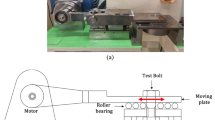Abstract
The correct tension or pre-load applied to a bolt is critical to the reliability of a bolted joint assembly. If the pre-load is too low and the joint is subject to cyclic loads, the fatigue reliability may be compromised. Alternatively, if the tension is too high, the reliability may again be questionable due to either yielding of the bolt or an increasing risk of environmental induced cracking. Simple laboratory tests have been performed to show that microhardness is sensitive to strain hardening in a bolt that has yielded. The thread root radius can also be measured to determine whether a threaded fastener has been stretched past the yield point. This paper summarizes the laboratory tests to evaluate yielding and presents a fracture mechanics-based approach to determine if a bolt is at risk from environmental effects because of too high a clamp load or tensile stress.
Similar content being viewed by others
Author information
Authors and Affiliations
Corresponding author
Rights and permissions
About this article
Cite this article
Baggerly, R. Evaluating the Effects of Overtorque in Bolts. J Fail. Anal. and Preven. 1, 41–46 (2001). https://doi.org/10.1007/s11668-006-5012-5
Published:
Issue Date:
DOI: https://doi.org/10.1007/s11668-006-5012-5




